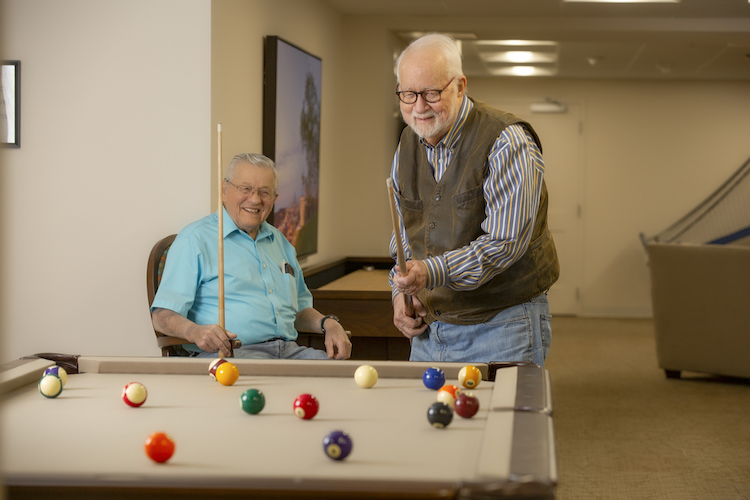It’s never easy to see aging parents, or other aging loved ones, experience physical or mental difficulties. Memory loss conditions like Alzheimer’s and dementia are especially emotional, making it hard to think through everything involved in seeking memory care when the time comes.
Here are the most important aspects to consider when deciding if it’s time to place your loved one in memory care.
When to Seek Memory Care for Aging Loved Ones
The moment of a memory loss diagnosis isn’t necessarily the moment it’s time to seek Memory Care for your aging parent. Many seniors can continue living independently or in assisted living in the earlier stages of Alzheimer’s or dementia. And the earlier you can start the conversation, the better.
Even if signs of dementia are few and far between (or none at all!), it’s never a bad time to speak about their desires when the time comes. Ask open-ended questions: What do they desire if the time comes when they can’t safely live independently? If it’s necessary, what kind of setting are they interested in for memory care? Difficult conversations like these can be more manageable when the need for memory care isn’t imminent.
Here are some of the warning signs that indicate it may be time to start the conversation about memory care:
- Your loved one struggles to speak or write their thoughts
- Your loved one has a hard time with directions and may get lost easily in familiar places
- Your loved one is neglecting daily hygiene tasks, or finding it challenging to remember changing their clothes or bathing
- Your loved one’s behavior is out-of-the-ordinary for them, with signs of paranoia and increased nervousness and anxiety
- Things that used to be easy for your loved one to learn or remember are suddenly very difficult
- Your loved one’s forgetfulness has led to potentially dangerous situations (i.e., forgetting to turn off the oven or getting lost in a once-familiar space)
If you’ve seen one or more of these signs in your parent, it may be time to consider memory care. This is also something you can discuss with your loved one’s doctor.
Three Things to Consider When Seeking Memory Care
Once you’ve decided it’s the right time to seek Memory Care for your loved one, you need to begin the process. This means preparing your loved one and yourself for the lifestyle adjustments, as well as finding the right memory care facility where your loved one can live safely and joyfully. Here are three things you should think about throughout this process:
Consider Their Needs
Everyone has basic needs that must be met for a fulfilling, healthy life. Your loved one needs to be physically safe. But this isn’t where their needs and comfort end. When seeking memory care, you should look for a community with a holistic approach that is designed to meet residents’ every need, from physiological to love, purpose, and belonging.
At St. Anthony’s, we break these needs down into six memory care distinctives designed with resident needs in mind. These include:
- Team development
- Family partnerships
- Life enrichment
- Personalized, supportive environment
- Dining experience
- Wellness
If you’ve decided to seek memory care, it’s likely because your loved one is no longer able to safely care for themselves. By choosing memory care at St. Anthony’s, you are giving them a home where they can feel loved and cared for in a safe, secure environment.
Consider Their Wants
On particularly difficult days with memory loss illnesses, it is still important to give memory care residents the opportunity to express their desires and have a say in their personalized memory care plan.
Although it may be difficult, try to include your parent in the conversation. This may be a discussion that happens before memory loss has reached a point where they require additional care, in which you ask for their insight on what they will want when the time comes.
Consider the Transition
Any major life change involves a lot of transition! Your loved one may be moving from assisted living to memory care, or they may be leaving their family home for the first time to seek additional care. To make this family transition a positive experience for everyone involved, follow these tips:
- Acknowledge everyone’s feelings, including your own
- Be patient — with your loved one and with other family members
- Visit your loved one frequently, especially in the early days of memory care when they’re transitioning to their new space
- Fill your loved one’s new apartment with familiar, nostalgic items to make it feel like home
- Be an advocate for your loved one and their desires
- Give yourself, your loved one, and everyone else involved a lot of grace
Moving your parent into a memory care community like St. Anthony’s does not mean your involvement ends where ours begins! Family partnerships are essential to helping your loved one feel right at home and have a joy-filled experience.
Choosing the Right Memory Care Community
When seeking memory care for your loved one, one of the key decisions you have to make is which facility or community is right for them. While there are many types of senior living options available to your loved one, the best options are the ones where your parent can feel safe, loved, and right at home.
While some memory care facilities have very small rooms with hardly more than a bed and a TV, our spacious apartments for Memory Care residents come with full-size bathrooms and all the privacy your loved one needs to tailor the space to their wants and needs. We believe your loved one deserves to feel loved, understood, and appreciated.
If the time has come for you to seek memory care for your aging loved one, we would be honored to welcome them home to our family at St. Anthony’s! Get in touch with us to schedule a tour and learn more about our memory care program.




